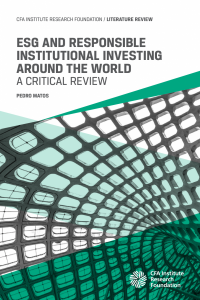
Download here: https://www.cfainstitute.org/en/research/foundation/2020/esg-and-responsible-institutional-investing
This survey examines the vibrant academic literature on environmental, social, and governance (ESG) investing. While there is no consensus on the exact list of ESG issues, responsible investors increasingly assess stocks in their portfolios based on nonfinancial data on environmental impact (e.g., carbon emissions), social impact (e.g., employee satisfaction), and governance attributes (e.g., board structure). The objective is to reduce exposure to investments that pose greater ESG risks or to influence companies to become more sustainable. One active area of research at present involves assessing portfolio risk exposure to climate change.
This literature review focuses on institutional investors, which have grown in importance such that they have now become the largest holders of shares in public companies globally. Historically, institutional investors tended to concentrate their ESG efforts mostly on corporate governance (the “G” in ESG). These efforts included seeking to eliminate provisions that restrict shareholder rights and enhance managerial power, such as staggered boards, supermajority rules, golden parachutes, and poison pills.
In addition, this review of ESG literature determines the following:
- There is no consensus on the exact list of ESG issues and their materiality.
- The ESG issue that gets the most attention from institutional investors is climate change, in particular their portfolio companies’ exposure to carbon risk and “stranded assets.”
- Investors should be positioning themselves for increased regulation, with the regulatory agenda being more ambitious in the European Union than in the United States.
Readers might come away from this survey skeptical about the potential for ESG investing to affect positive change. I prefer to characterize the current state of the literature as having a “healthy dose of skepticism,” with much more remaining to be explored. Here, I hope the reader comes away with a call to action. For the industry practitioner, I believe that the investment industry should strive to achieve positive societal goals. CFA Institute provides an exemplary case in its Future of Finance series. For the academic community, I suggest we ramp up research aimed at tackling some of the open questions around the pressing societal goals of ESG investing. I am optimistic that practitioners and academics will identify meaningful ways to better harness the power of global financial markets for addressing the pressing ESG issues facing our society.
About the Author(s)
Pedro Matos is the academic director of the Richard A. Mayo Center for Asset Management, holds the John G. Macfarlane Family Chair in Business Administration, and is a professor of business administration (finance) at the University of Virginia Darden School of Business. His research focuses on the growing importance of institutional investors in financial markets worldwide. Professor Matos’s work has been published in top academic journals and featured in such publications as the Economist, the Financial Times, the New York Times, the Washington Post, Fortune, and Forbes. He is a research associate at the European Corporate Governance Institute and a member of the UN-supported Principles for Responsible Investment’s Academic Network Advisory Committee. Professor Matos’s work has received numerous research grants and awards. He has won the Wells Fargo Awards for Excellence in Course Material Development and for Outstanding Research Publication and the Darden Multiyear Publications Award. Previously, Professor Matos taught at the USC Marshall School of Business, where he received a Golden Apple teaching award, and he has worked with the Portuguese Ministry of Finance and consulted for the World Bank. He holds a BA in economics from NOVA University Lisbon and a PhD in finance from INSEAD.








